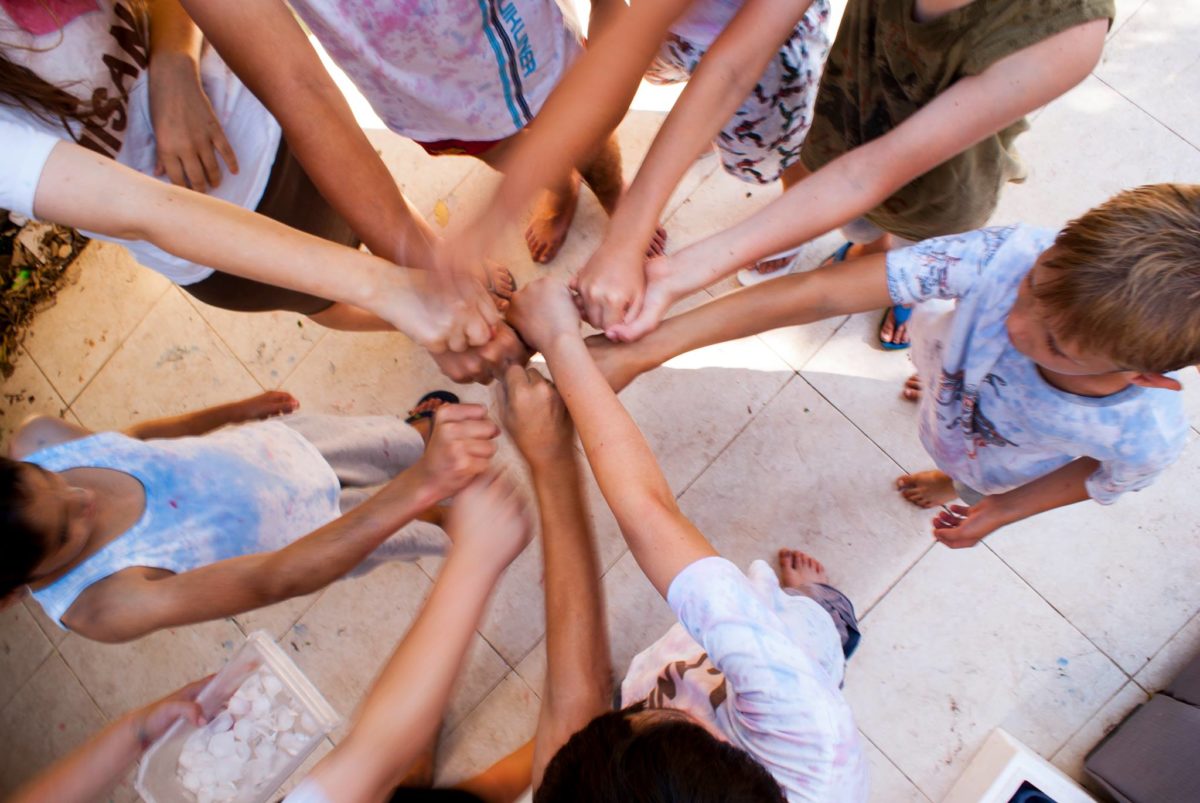Your Daily Phil: Open for bitcoin business + fundraising in a crisis
Good Thursday morning!
Nonprofits reported a 32% increase in online giving between 2020 and 2019, according to an annual survey of 200 nonprofits in the United States and the U.K. by M+R, a fundraising and marketing firm. In 2019, online revenue grew by 10%.
Teens involved with Rachel’s Table, a program of the Jewish Federation of Western Massachusetts that works to reduce food waste and alleviate hunger, donated 640 seedlings to groups that feed the hungry, some of which they helped to plant.
May is Mental Health Awareness Month, and volunteer organization Repair the World will participate in a mental health effort sponsored by the Blue Dove Foundation, a Jewish group working to destigmatize mental illness and substance abuse.
Volunteering itself benefits volunteers, Repair the World CEO Cindy Greenberg told eJewishPhilanthropy: “Our service corps members are reporting to evaluators a boost to their mental health through the work they are doing, even though we didn’t ask them about it directly.”
The Women of Reform Judaism yesterday announced grants of $210,400 to 15 programs, including Bayit, a cohort for Jews of Color that’s part of Avodah, the service organization, and LUNAR: The Jewish-Asian Film Project.
CASH ALTERNATIVES
Bitcoin can now plant a tree in Israel

WIKIMEDIA COMMONS/CREATIVE COMMONS
The Jewish National Fund-USA (JNF-USA), which fundraises and makes grants on behalf of projects in Israel, is open for bitcoin business. “There’s an increase in giving in cryptocurrency, so why not be in the mix?” Matt Bernstein, JNF-USA’s chief planned giving officer, told eJewishPhilanthropy’s Helen Chernikoff, who spoke with fundraisers and investment experts about cryptocurrency contributions and their possible risks.
Big spender: “Cryptocurrency donations are usually not small-dollar donations,” said Ryan Raffin, a partner at the Jacksonville, Fla.-based risk management firm Charitable Solutions. “The lowest we’ve ever encountered would have been five figures; we’ve seen donations that are seven figures or more.”
Touch and go: A single bitcoin is worth around $55,000, but its value can fluctuate significantly. This past Sunday, its value fell 11% from a record high of nearly $65,000 per coin. Nonprofits don’t need to worry about cryptocurrencies’ price swings if they sell donations right away, said Michael Bloch, a former principal at the global consulting firm McKinsey & Company who now advises Israeli startups. Bernstein said that’s what JNF-USA intends to do. “The minute we get it we’re going to convert it to cash. It’s highly volatile, and we’re not in the speculation business. This is our general policy; it’s what we do with stock.”
In the community: Chabad, which has been accepting donations in cryptocurrency since 2013 and published an article contemplating its spiritual meaning and status in Jewish law, has the same policy. Chabad gets a “moderate amount” of donations in cryptocurrency, said a spokesman, Rabbi Motti Seligson, but the vast majority of its monetary donations are in forms backed and regulated by governments. Similarly, this past December, the San Francisco-based Jewish Community Federation and Endowment Fund announced a partnership with Endaoment, a nonprofit community foundation that had developed cryptocurrency donation software, to convert such donations into dollars as they flow into the federation’s donor-advised fund.
A NEW MODEL
A better path forward in Jewish day school education: Hillel Rapp’s model

Shutterstock
“Two articles were recently published in eJewishPhilanthropy about the cost of day school tuition. One touted the upsides of using smaller donations to subsidize the cost of tuition for students/families on the fence about Jewish education. This was presented as a creative alternative to multimillion dollar funds that provide sliding scale, needs-based scholarships to families, which was the subject of the other article. I want to push back on the assumptions underlying both of these financial structures and suggest a different model that, after startup costs, doesn’t require continued philanthropic investment,” writes Lindsey Bodner in an opinion piece for eJewishPhilanthropy.
Viable models: “We are at a pivotal point: educators and schools have demonstrated remarkable creativity and resilience over the past year. Rather than returning to a flawed ‘normal,’ we should harness that energy. I do not believe it’s an incontrovertible fact that quality Jewish education is simply out of reach for so many families. Neither should we accept that grandparents, large foundations, or individual donors must foot the bill.”
INSIDE ISRAEL
Record fundraising during a pandemic: The five lessons Orr Shalom learned

Courtesy
“Nonprofits are often well-adapted to fundraising in moments of crisis. Nonprofits in Israel are especially adept at securing extra funds in times of crisis, especially from North America. But how does one fundraise when the entire world is experiencing the same crisis?” writes Naomi Liberman in an opinion piece for eJewihPhilanthropy.
The challenge: “In the spring of 2020, the Orr Shalom External Affairs team struggled over how best to raise resources and build partnerships during this new and unexpected reality brought about by COVID-19. And while we debated how to respond, Orr Shalom’s 1,400 children were in need of extra funds to combat the effects of the pandemic on their lives. Our children needed extra counselors, extra therapists, extra academic help as schools pivoted to Zoom; our graduates needed living stipends and rent assistance as their futures, which they already experienced as tenuous, began to crumble in front of their eyes.”
Moving forward: “We debated extensively – in countless Zoom staff meetings – regarding the best strategies for moving forward. On the one hand, we had to be sensitive to the facts on the ground: we needed to honor the fact that people were losing their loved ones and their jobs; on the other hand, our programs had to continue operating and the organization was depending on our team to raise the funds necessary to ensure continuity of all programs and services. Ultimately, we put in place a series of strategies that led us to exceed our pre-pandemic goals by 25%.”
Worthy Reads
Historical Context: The giving circle movement has the power to make philanthropy more democratic, as the community foundation did in 1914, writes Michael Layton in a blog post on the website of the Dorothy A. Johnson Center for Philanthropy. Giving circles’ missions are especially timely, Layton states, due to parallels between the current movement and the Gilded Age of the early 1900s, including the increasing concentration of wealth and political polarization. “Giving circles offer a powerful catalyst for changing how we think about community engagement, who is a philanthropist, and what every member of a community brings to the table,” he concludes. [JohnsonCenter]
Pandemic Takeaways: In the Chronicle of Philanthropy, Emily Hynes interviews Benjamin Soskis, a historian with an expertise in Jewish philanthropy, on the insights to be drawn from his new report about the impact of the pandemic on the nonprofit sector — “Norms and Narratives That Shape U.S. Charitable and Philanthropic Giving.” Soskis predicts that philanthropic responses like quicker gifts and fewer administrative requirements for grantees might not outlive the pandemic, but that the more widespread use of cash transfers and enthusiasm for mutual aid societies will. Nonprofits can support the mutual aid movement, he said: “There are elements of mutual aid that tap into the desire to help one’s neighbor, which are compatible with that kind of traditional nonprofit landscape.” [ChroniclePhilanthropy]
Think Back: The pandemic has disrupted many careers, but this transitional moment can be usefully seized to consider three aspects of work that are central to future success, write Dorie Clark and Tomas Chamorro-Premuzic in the Harvard Business Review. Workers should take the time to ask themselves what the pandemic taught them in terms of who they can count on, how they work best and what they think of their managers. “In short, there’s a very real possibility that, thanks to the greater flexibility and opportunities enabled by the crisis, far more professionals may have the opportunity to craft work and careers they truly enjoy,” Clark and Chamorro-Premuzic write. [HBR]
This Is Giving: The rhetoric of Global Citizen’s “Give While You Live” campaign, which urges the wealthy to give now instead of after their deaths, overstates what it actually asks them to do — give away 5% of their wealth, reflects Joanne Florino in a post for the Philanthropy Roundtable’s website. She notes that Global Citizen cherishes a lofty mission of ending extreme poverty and protecting the planet, and that foundations, which tend to outlive their creators, will also be useful in pursuing those goals. “Arbitrary mandates are certainly not the answer. The decision to give over multiple generations or shut a philanthropic organization down in a donor’s lifetime rests — as it should —with the donor and his/her governing board,” Florino asserts. [PhilanthropyRoundtable]
Community Comms
Apply: The Jewish Council of the Emirates Community Centre seeks a Dubai-based Executive Director.
Apply: The Kirsh Foundation seeks a full-time NY-based Program and Special Initiatives Coordinator.
Apply! Want to join the team at Jewish Insider/eJewish Philanthropy? We’re looking for a top-notch philanthropy editor. Learn more here.
Be featured: Email us to inform the eJP readership of your upcoming event, job opening, or other communication.
Word on the Street
Lord John Browne, the former CEO of BP, has donated £2 million to Cambridge University’s Murray Edwards College, its largest single donation since 2008… Philadelphia real estate icon Ronald Rubin has died at age 89… 800 foundations signed a pledge to adopt more trust-based practices in order to move money more quickly and with fewer restrictions… Keren Kayemeth L’Israel – Jewish National Fund is postponing a contentious vote scheduled for today to approve widespread land purchases in the West Bank… An exhaustive report on racial inclusivity, commissioned by the U.K.’s Board of Deputies, has produced a controversial list of 119 changes to be made across 17 areas of the community…
Pic of the Day

Hazon
The Jewish environmental group Hazon celebrated Earth Day at Isabella Freedman Jewish Retreat Center yesterday by planting trees.
Birthdays

Flickr stream GES 2016 / Wikimedia Commons
Chief Financial Officer of Alphabet Inc. and its subsidiary Google, Ruth Porat…
Calgary-based CEO of Balmon Investments, Alvin Libin… Actor and later one of Hollywood’s most prolific producers, Mark Damon… Co-founder of Human Rights Watch, formerly national director of the ACLU and president of George Soros’s Open Society Institute, Aryeh Neier… English journalist and former anchor of BBC Television’s Newsnight, Adam Eliot Geoffrey Raphael… Former U.S. Poet Laureate and winner of a Pulitzer Prize, she was the 2020 Nobel Prize laureate in literature, Louise Elisabeth Glück... Conductor and professor of music at Boston University, Joshua Rifkin… Recent mayor of Madison, Wisconsin (2011-2019), he had served as mayor twice before (1973-1979 and again 1989-1997), Paul R. Soglin… British economist and former Chief Economist at the World Bank, Sir Nicholas Herbert Stern… Real estate developer and principal owner of the NFL’s Minnesota Vikings, Zygmunt “Zygi” Wilf… Three-time Pulitzer Prize-winning investigative reporter for The Washington Post, Sari Horwitz… NYC area accountant, Edward Lifshitz… New Zealand native now serving as the CEO of Australian-based job-board SEEK, Ian Narev… NYC-based attorney and member of Kriss & Feuerstein LLP, Jerold C. Feuerstein… News director of The Forward, Benyamin Cohen… Member of the Knesset for the Blue and White alliance, he now serves as Minister of Culture and Sport, Yehiel Moshe “Hili” Tropper… Midwest bureau chief at The Wall Street Journal, Shayndi Raice… Entrepreneur, investor, and former president of Y Combinator and now the CEO of OpenAI, Sam Altman… Recent graduate from New York University School of Law, Zachary Krooks… Competitive ice dancer, Elliana Pogrebinsky… Israeli columnist at Kan News, contributing opinion writer for the New York Times and the Jewish Journal, Shmuel Rosner…








